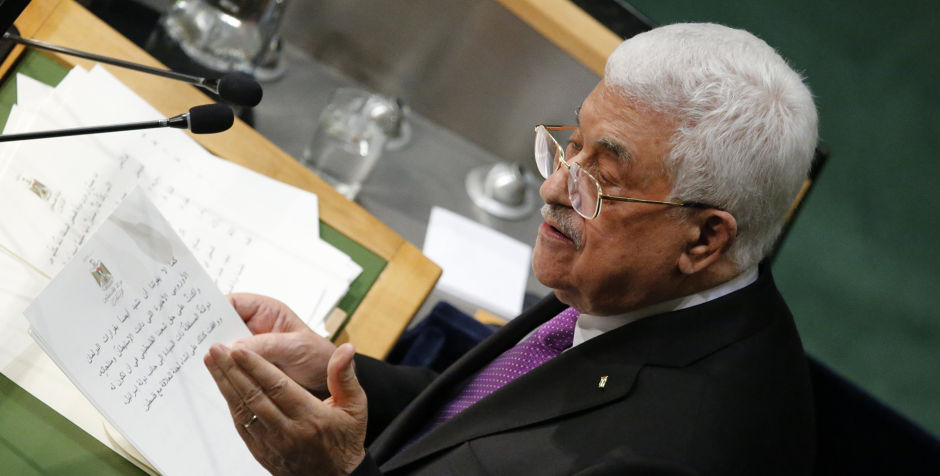Implications of the Palestinian Repudiation of the Oslo Accords
On September 30, 2015, Mahmoud Abbas, President of the Palestinian Authority, addressed the UN General Assembly in his role as “President of Palestine.” In his UN address, Mr. Abbas recited his rendition of the history of Palestine and, as he so often does, accused Israel of all manner of violations of various agreements entered into between Israelis and Palestinians while claiming that the Palestinians desired nothing but justice and peace.
How easy it is to forget the thousands of rockets fired at Israeli civilian settlements from Palestinian Gaza! The only word that can even begin to describe such a litany of straight-faced half-truths and outright untruths is that fine Yiddish word chutzpah!
It takes considerable practice to deliver lies and half-truths so convincingly. It doesn’t hurt either when most of one’s audience is made up of individuals obtuse to the concepts of truth, justice, and the rule of law. Such persons take neither the time nor the effort to separate fact from fiction. Instead, they are conditioned like Pavlov’s dogs to respond positively to any tidbit of anti-Israel propaganda, no matter how obviously wrong and outrageous such propaganda may be.
One of the most interesting (and significant) revelations in Mr. Abbas’s address was his public repudiation of the Oslo Accords and their corollary agreements. The Oslo Accords have formed the framework within which the final peace between Israelis and Palestinians was to be achieved. Over the years, both sides have accused the other of violating the agreements. Yet, despite the fact that the Oslo Agreement was to have achieved an independent Palestinian state by 1999, until yesterday, neither side had repudiated the agreement, primarily because, imperfect though it was, it was the basis upon which the progress that has been achieved was achieved. In other words, despite its imperfections, real progress had been made under the Oslo Accords.
By repudiating the Oslo Accords, Mr. Abbas is confirming that Palestine views negotiations with Israel as not in the Palestinians’ best interests. Why? Because serious negotiations require mutual, often painful, concessions by both sides, concessions that Palestine refuses to even entertain. Hence, Mr. Abbas is now banking—as he has so often in the past—on having the international community bring pressure to bear on Israel to concede to the Palestinians—wholly apart from good faith negotiations—what the Palestinians were unable to obtain via face-to-face talks.
This can be a risky strategy. How so? By repudiating the Oslo Accords, the legal basis for the very existence of the Palestinian Authority no longer exists. By repudiating the Oslo Accords, the legal basis for Palestinian control of any portion of the West Bank no longer exists. By repudiating the Oslo Accords, Israel is no longer bound to turn over tax monies to support Palestinian institutions. In the final analysis, when Mr. Abbas repudiated the Oslo Accords, he freed Israel from all of its obligations under the Accords. He also freed other nations from their obligations to support the peace process.
In light of the Palestinian repudiation of the Olso Accords, the ACLJ is going to be looking closely into what actions the United States should take in light of Mr. Abbas’s unilateral action. To begin with, we urge the President to cease all monetary support of the Palestinians, since they were the ones to formally breach the agreement. We also urge the President to stop applying pressure on Israeli officials to make concessions to the Palestinians when, in fact, it is the Palestinians who are the intransigent party.
The unilateral repudiation by the Palestinians of the Oslo Accords should give us pause to reevaluate U.S. policy vis-à-vis the Israeli-Palestinian conflict.
We must reject once and for all the manipulative games the Palestinians play.
The United States must once again recognize where our true interests lie and stand strongly with Israel.
